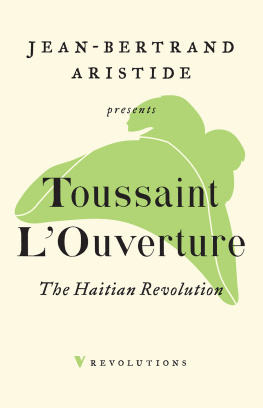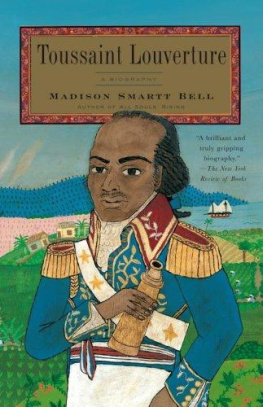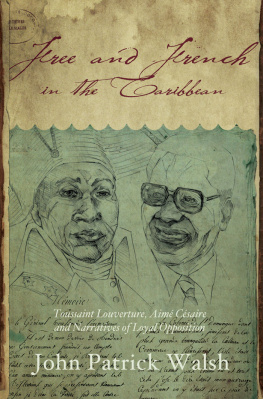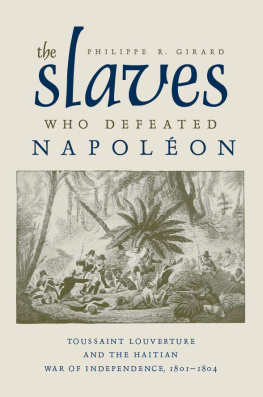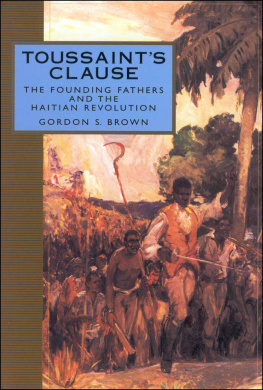
TOUSSAINT LOUVERTURE

This essential new series features classic texts by key figures that took center stage during a period of insurrection. Each book is introduced by a major contemporary radical writer who shows how these incendiary words still have the power to inspire, to provoke and maybe to ignite new revolutions
Also available:
Wu Ming presents Thomas Mntzer:
Sermon to the Princes
Slavoj iek presents Trotsky:
Terrorism and Communism
Michael Hardt presents Thomas Jefferson:
The Declaration of Independence
Slavoj iek presents Mao:
On Practice and Contradiction
Walden Bello Presents Ho Chi Minh:
Down With Colonialism!
Alain Badiou presents Marx:
The Civil War in France
Tariq Ali presents Castro:
The Declarations of Havana
Slavoj iek presents Robespierre:
Virtue and Terror
Terry Eagleton presents Jesus Christ:
The Gospels
Geoffrey Robertson presents The Levellers:
The Putney Debates
TOUSSAINT LOUVERTURE

THE HAITIAN REVOLUTION
INTRODUCTION BY DR JEAN-BERTRAND ARISTIDE
EDITED BY
NICK NESBITT

This edition published by Verso 2019
First published by Verso 2008
Introduction Jean-Bertrand Aristide 2008, 2019
Selection and editorial matter Verso 2008, 2019
All rights reserved
The moral rights of the author have been asserted
1 3 5 7 9 10 8 6 4 2
Verso
UK: 6 Meard Street, London W1F 0EG
USA: 20 Jay Street, Suite 1010, Brooklyn, NY 11201-8346
www.versobooks.com
Verso is the imprint of New Left Books
ISBN-13: 978-1-78873-657-2
ISBN-13: 978-1-78873-658-9 (UK EBK)
ISBN-13: 978-1-78873-659-6 (US EBK)
British Library Cataloguing in Publication Data
A catalogue record for this book is available from the British Library
Library of Congress Cataloging-in-Publication Data
A catalog record for this book is available from the Library of Congress
Typeset by Hewer Text UK Ltd, Edinburgh
CONTENTS
In 1804 Haiti emerged as the first black republic from the worlds only successful slave revolution. The outstanding leader who charted the course of this historic event was a slave whose name is now a timeless symbol of freedom: Toussaint LOuverture. The written works he left, his memoirs and letters, and the constitution he drafted, offer insight into his political, theological and economic legacy. For us, following in Toussaints footsteps, his written record raises three core questions. To what extent did Toussaint liberate himself not only from physical slavery, but from mental slavery to the colonial system he fought? Second, on the theological plane, does Toussaints legacy offer a line of liberation that can be implemented today? And lastly, would fulfilling Toussaints social and economic legacy allow us to eradicate poverty, the modern version of slavery, and move towards real freedom?
From the transatlantic slave trade to todays global system of economic slavery, broad ranges of players have worked to maintain colonialism. Those I would call mental slaves, the colonized who nonetheless defend the interests of white colonizers, have always played a crucial role in upholding slavery, then and now. Perhaps the most powerful criticism that has been levelled at Toussaint was that he was overprotective of the masters and their system. Loved by a majority, feared by a minority, and perceived by some in hindsight as having been too kind, too gentle and too diplomatic towards the colonizers, Toussaints true personality emerges in his writings and his achievements. Hence our first question: Did this former slave remain a mental slave to the system he sought to overthrow?
The name of God has been used strategically over four centuries to try to justify slavery. Yet academic discourse on slavery tends to focus much more on the political than the theological dimensions of the slave system. The religious references in Toussaints writings offer an opportunity to examine this theological field and to question whether Toussaint himself left behind a theological legacy of liberation that can be contextualized or implemented.
The dream held by Toussaint was a two-sided coin: on one side political freedom, on the other economic freedom. Over the past 200 years, very little has been said about Toussaints determination to eradicate poverty, which was, and still is, inextricably linked to slavery. Thus a third question arises: How can we eradicate poverty by fulfilling Toussaints social legacy?
TOUSSAINT: FORMER SLAVE NOT MENTAL SLAVE
The nervous system of the human body can be disrupted by both intrinsic and extrinsic disorders. The body politic is susceptible to the same disruptions. Since 1492, and continuing to this day, colonialism and neocolonialism have been a permanent source of extrinsic disorder to Haiti. Internally, mental slaves from the Haitian elite have generated intrinsic pathologies throughout the countrys social fabric that have blocked sustainable development. For the colonizers, blacks fell into two categories: slave and mental slave. Which of these was Toussaint LOuverture?
Franois Dominique Toussaint LOuverture was the son of Gaou-Guinou, an Arada prince born in present-day Benin,
Africa, who was shipped to Haiti as a slave. Gaou-Guinou was baptized and became known as Hypollite. His second marriage was to a woman named Pauline. The two had four daughters and four sons Jean, Paul, Pierre and Toussaint. The family lived in Haut du Cap, a village near Cap-Haitian, the second city of Haiti. Toussaint was born on the Brda Plantation in Cap-Haitian, which in 1786 would become the property of the Comte de No. The uncertainty surrounding Toussaints date of birth reflects how slaves were reduced to objects in the eyes of the colonizers. At least four different dates have been proposed: 1739, based on a letter Toussaint addressed to the French Directory in 1797; 1746, according to his son Isaac; 1743, based on several sources; and 1745, based on documents from Fort de Joux, the French military installation where he was imprisoned, and ultimately died.
At the time of his birth, whatever the date, few thought that he would survive. His frail physique inspired the nickname Fatra baton, meaning a stick so thin that it should be thrown in the garbage. But the child surprised everyone. Toussaint developed exceptional physical and intellectual capacities; very early he distinguished himself from the many others on the Brda Plantation. At first assigned to work with the estate animals, LOuverture became coachman to the estate manager and then steward of all the livestock. In 1799, the plantation owner, Bayon de Libertat, said of Toussaint: I entrusted to him the principal branch of my management, and the care of the livestock. Never was my confidence in him disappointed.
Toussaint had long nurtured good relations with some colonizers, and on the eve of the slave insurrection of 1791 he had even saved some of their lives. His legacy has endured some harsh criticism on this point. But his was essentially a moderate, temperate character, self-controlled and diplomatic in style. Despite the violence of the slave system, Toussaint did not adopt a violent comportment, based in turn on revenge and hatred. How did he manage to cultivate these precious personal qualities while developing skills vital to navigating within the complex political arena in which he found himself?
Next page
